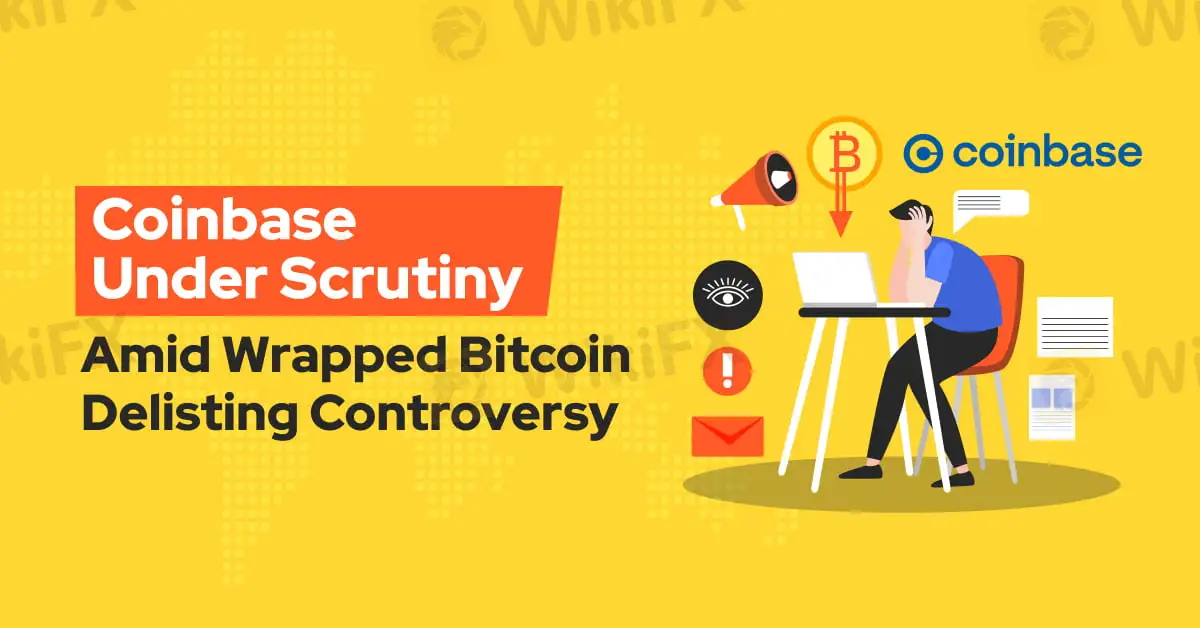Coinbase Under Scrutiny Amid Wrapped Bitcoin Delisting Controversy
Abstract:Coinbase has come under fire after announcing its decision to delist Wrapped Bitcoin (wBTC), a move critics claim could be driven by competitive interests. The delisting, set to take effect on 19 December, has sparked allegations of market manipulation and concerns about fairness in the cryptocurrency ecosystem.

Coinbase has come under fire after announcing its decision to delist Wrapped Bitcoin (wBTC), a move critics claim could be driven by competitive interests. The delisting, set to take effect on 19 December, has sparked allegations of market manipulation and concerns about fairness in the cryptocurrency ecosystem.
The controversy centres around BiT Global, a key player in the wBTC market. Following Coinbase's announcement, BiT Global accused the platform of using the delisting to undermine wBTC and bolster the adoption of its own Bitcoin wrapper, Coinbase Wrapped Bitcoin (cbBTC). According to BiT Global, Coinbases actions are designed to “eliminate its largest and most influential competitor,” thereby forcing investors to adopt cbBTC instead.
Coinbase, however, has strongly refuted these allegations. In a statement, the company insisted that the decision to remove wBTC was solely based on its asset review process. Coinbase emphasised that all listed assets must independently comply with its stringent listing standards, adding that wBTC no longer met these requirements. The platform dismissed claims of ulterior motives, stating that the delisting was unrelated to cbBTCs market performance.

Wrapped Bitcoin products like wBTC and cbBTC play a pivotal role in decentralised finance (DeFi) ecosystems. They enable Bitcoin to function on other blockchain networks, increasing its utility in DeFi applications. Despite the ongoing dispute, wBTC remains the most widely adopted Bitcoin wrapper, boasting over $14 billion in total value locked (TVL). Meanwhile, cbBTC, which was launched by Coinbase in September, has gained traction rapidly, amassing $1.5 billion in TVL to date.
The decision to delist wBTC also comes amidst broader concerns about its custodian, BitGo. The firms partnership with BiT Global has attracted scepticism within the crypto community, partly due to the involvement of Justin Sun, a figure often associated with controversy. Some rivals, including the team behind Threshold, another Bitcoin wrapper, have raised concerns about potential mismanagement of collateral in projects tied to Sun.
The timing of Coinbases decision adds another layer of intrigue. It coincides with reports that Coinbase CEO Brian Armstrong is scheduled to meet President-elect Donald Trump to discuss possible “personnel appointments.” Recent cabinet selections by Trump have signalled a pro-crypto stance, with high-profile appointments such as Robert F. Kennedy as Secretary of Health and Human Services and Elon Musk and Vivek Ramaswamy leading the Department of Government Efficiency. These figures are known for advocating crypto-friendly policies, fuelling speculation about the future of cryptocurrency regulation in the United States.
As the dispute unfolds, the crypto community is closely watching the impact of Coinbases decision on both wBTC and cbBTC. The controversy highlights the challenges of maintaining transparency and fair competition in the rapidly evolving digital asset space. Whether the delisting will ultimately reshape the dynamics of the Bitcoin wrapper market remains to be seen, but the situation underscores the importance of accountability and trust in the cryptocurrency industry.

Read more

Gigamax Scam: Tracking Key Suspects in RM7 Million Crypto Fraud
Malaysian authorities are actively pursuing seven individuals linked to the Gigamax investment scam, which has defrauded investors of over RM7 million. The suspects include an Indonesian national, identified as Awaludin, who is believed to be the mastermind behind the scheme, and six Malaysians who served as promoters and speakers for the fraudulent operation.

Singaporean Arrested in Thailand for 22.4 Million Baht Crypto Scam
Thai authorities have apprehended a 32-year-old Singaporean man suspected of being part of a transnational syndicate involved in cryptocurrency scams. The group is accused of defrauding victims of more than 22.4 million baht (S$886,000) through a fraudulent trading platform.

Kraken and BitGo to Handle FTX Payouts Starting January 2025
Kraken and BitGo will oversee the first FTX payouts starting January 3, 2025. 98% of creditors receive at least 118% of their claims in cash.

FCA Seeks Input to Shape UK Crypto Market Regulations
UK FCA seeks public feedback on crypto rules to improve market transparency, protect consumers, and support growth. Comments are open until March 2025.
WikiFX Broker
Latest News
Volkswagen agrees deal to avoid Germany plant closures
Geopolitical Events: What They Are & Their Impact?
Top 10 Trading Indicators Every Forex Trader Should Know
TradingView Launches Liquidity Analysis Tool DEX Screener
MultiBank Group Wins Big at Traders Fair Hong Kong 2024
WikiEXPO Global Expert Interview: Simone Martin—— Exploring Financial Regulation Change
'Young investors make investment decisions impulsively to keep up with current trends' FCA Reveals
Why Do You Feel Scared During Trade Execution?
CySEC Settles Compliance Case with Fxview Operator Charlgate Ltd
Malaysian Influencer Detained in Taiwan Over Alleged Role in Fraud Scheme
Rate Calc
